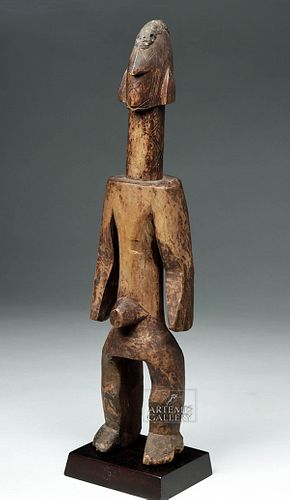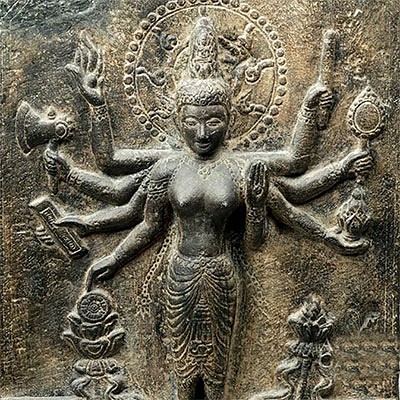Early 20th C. African Jukun Wooden Ancestor Figure
Lot 191
About Seller
Artemis Gallery
686 S Taylor Ave, Ste 106
Louisville, CO 80027
United States
Selling antiquities, ancient and ethnographic art online since 1993, Artemis Gallery specializes in Classical Antiquities (Egyptian, Greek, Roman, Near Eastern), Asian, Pre-Columbian, African / Tribal / Oceanographic art. Our extensive inventory includes pottery, stone, metal, wood, glass and textil...Read more
Categories
Estimate:
$2,000 - $2,500
Absentee vs Live bid
Two ways to bid:
- Leave a max absentee bid and the platform will bid on your behalf up to your maximum bid during the live auction.
- Bid live during the auction and your bids will be submitted real-time to the auctioneer.
Bid Increments
| Price | Bid Increment |
|---|---|
| $0 | $25 |
| $300 | $50 |
| $1,000 | $100 |
| $2,000 | $250 |
| $5,000 | $500 |
| $10,000 | $1,000 |
| $20,000 | $2,500 |
| $50,000 | $5,000 |
| $100,000 | $10,000 |
| $200,000 | $20,000 |
About Auction
By Artemis Gallery
Feb 4, 2021
Set Reminder
2021-02-04 10:00:00
2021-02-04 10:00:00
America/New_York
Bidsquare
Bidsquare : CLEARANCE Asian | Antiquities | Ethnographic
https://www.bidsquare.com/auctions/artemis-gallery/clearance-asian-antiquities-ethnographic-6361
Featuring discounted pricing on Asian art, classical antiquities from Egypt, Greece, Italy, and the Near East...plus Pre-Columbian, Tribal, Russian Icons, Spanish Colonial, Fine Art, more! Starting prices have been reduced up to 65% from original auction prices - perfect for dealers and collectors! Artemis Gallery info@artemisgallery.com
Featuring discounted pricing on Asian art, classical antiquities from Egypt, Greece, Italy, and the Near East...plus Pre-Columbian, Tribal, Russian Icons, Spanish Colonial, Fine Art, more! Starting prices have been reduced up to 65% from original auction prices - perfect for dealers and collectors! Artemis Gallery info@artemisgallery.com
- Lot Description
**Originally Listed At $1800**
Western Africa, inland Nigeria, Jukun peoples, ca. early 20th century CE. An entrancing anthropomorphic ancestral figure, hand-carved from hard wood, with simple yet enigmatic features. The figure stands atop delineated stocky legs which trace upwards to a slender torso accentuated with a projecting navel. Wide arms with stylized fingers hang from sharply-angled shoulders and terminate at a tubular neck. Presented upon a comparatively-petite head is an abstract visage comprised of a triangular nose, a miniscule mouth, large triangular ears, and a crested coiffure coated in a thick layer of desiccated earthen material. Covering the face and neck are several sets of hairline scarification marks, likely ritualistic in nature, while the exterior surfaces are enveloped in a smooth coffee-hued patina. Custom wooden display stand included. Size: 22" H (55.9 cm); 23.25" H (59.1 cm) on included custom stand.
The Jukun are a lesser-known ethno-linguistic group which reside primarily in inland Nigeria and small areas of northwestern Cameroon. Though the Jukun are divided into two primary groups, the "Jukun Wapa" and "Jukun Wanu," they are both ruled over by the "Aka Uku" (or king). The Aka Uku rules over each faction of the Jukun from the Wukari Federation, the primary socio-political center of the Jukun people, located south of the basin of the Benue River.
Until both Christianity and Islam made their way to Nigeria, the Jukun people traditionally worshipped a set of pagan deities. Wooden figures like this example, typically built in honor of a passed ancestor, were an important part of understanding and celebrating the natural processes of life, death, and the spiritual forces which governed both. In his book "The Tribal Arts of Africa: Surveying Africa’s Artistic Geography," (Thames and Hudson, 2004, p. 98) author Jean-Baptiste Bacquart explicates on how these types of "…solid ancestor figures were paraded through the village during times of danger and important communal ceremonies." Despite their adoption of both Christian and Islamic religions, such a display of the Jukun’s reverence for their predecessors suggests they still retain and adhere to at least some aspects of their previous paganist beliefs.
Provenance: private New York, New York, USA collection; ex-Christian Duponcheel collection, Belgium
All items legal to buy/sell under U.S. Statute covering cultural patrimony Code 2600, CHAPTER 14, and are guaranteed to be as described or your money back.
A Certificate of Authenticity will accompany all winning bids.
We ship worldwide and handle all shipping in-house for your convenience.
#132294Surface wear and abrasions commensurate with age, losses to feet and interior of legs, with small nicks to arms, torso, neck, and head. One small dent to torso, hairline fissures to legs and base of neck, with minor inactive insect damage, otherwise excellent. Nice earthen deposits as well as smooth brown patina throughout.Condition
- Shipping Info
-
All shipping is handled in-house for your convenience. Your invoice from Artemis Gallery will include shipping calculation instructions. If in doubt, please inquire BEFORE bidding for estimated shipping costs for individual items.
-
- Buyer's Premium



 EUR
EUR CAD
CAD AUD
AUD GBP
GBP MXN
MXN HKD
HKD CNY
CNY MYR
MYR SEK
SEK SGD
SGD CHF
CHF THB
THB
















